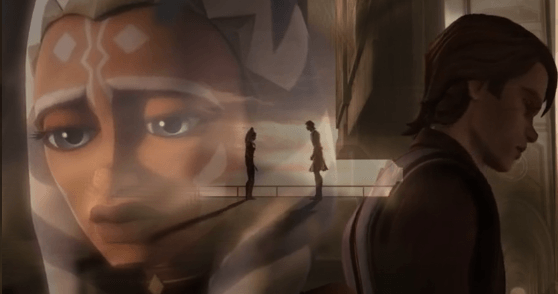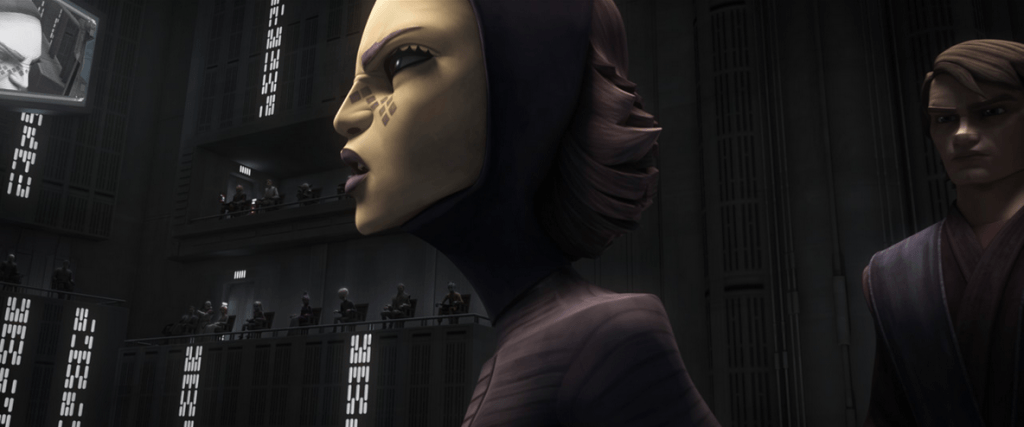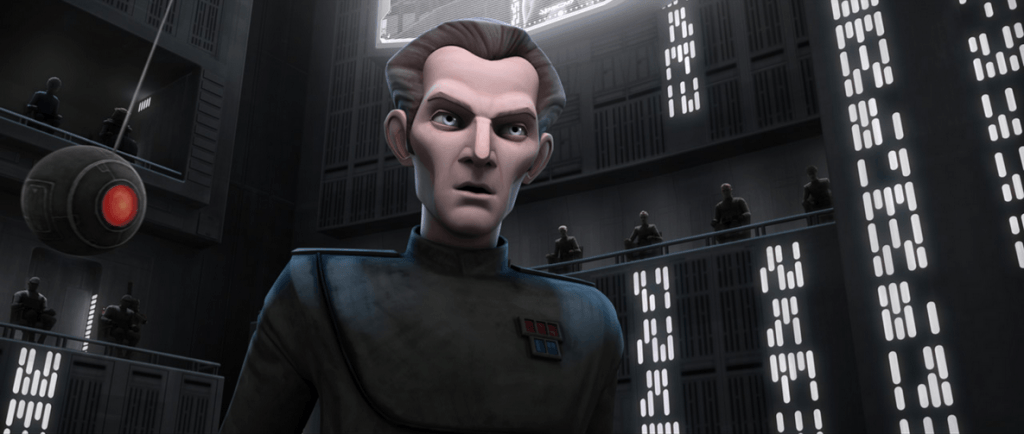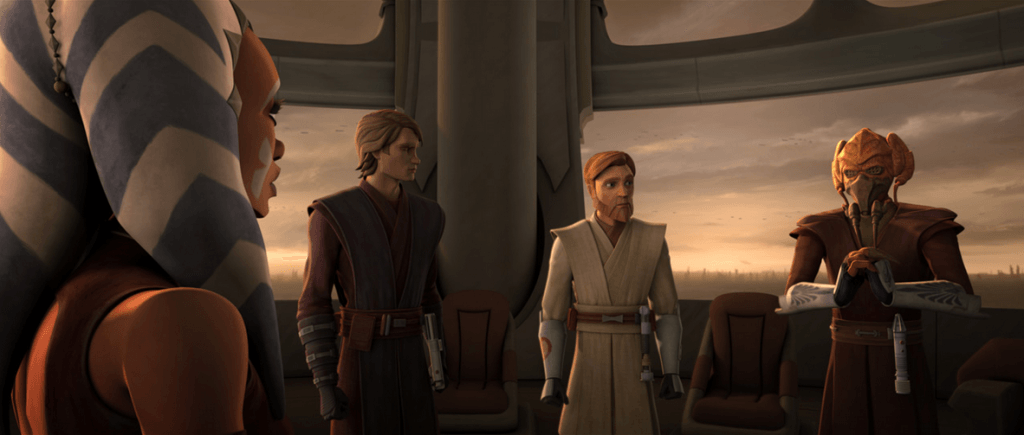The season 5 Clone Wars finale was really a successful culmination of the five-year tension that Star Wars fans have felt knowing the Ahsoka had to somehow disappear by the time Episode III came around in continuity. While there is (hopefully) still more of her tale to tell, we now can FINALLY watch Revenge of the Sith and not have to deal with someone smugly asking where Anakin’s padawan is. For me, this episode had one really awful component, but the rest of it was strong enough to make this a “top five” Clone Wars episode for me.
WARNING: FULL SPOILERS TO FOLLOW FOR THE SEASON 5 FINALE OF STAR WARS: THE CLONE WARS.
As a character-driven episode, I want to structure my thoughts following the different characters or groups involved in the episode. In terms of the major groups involved, I similarly thought that the way the show portrayed the “pre-imperial” republic was expertly handled and the Jedi council was brilliantly shown in this episode as well. I think that the portrayals of Anakin and Ahsoka are the best they have ever been (and that includes Anakin in the movies). This leaves the one sore spot, the handling of Barriss Offee… and it was very sore indeed.
Let’s start with Barriss and get her out of the way. Nothing about her inclusion in this episode (or this entire arc) was done well or did a service to the overall story. I haven’t personally read the MedStar series, but as an EU reader, I do cringe when the show unnecessarily tramples over existing canon. But my objection to Bariss’ inclusion goes beyond the inconsistency in continuity. Nothing about Barriss’ characterization up until this point hinted that she had this darkness in her or that she was starting to reject the order. It comes out of nowhere and you can’t help but feel that the writers wrote themselves into a corner and arbitrarily chose her to take the fall. At the same time, once the arc began, it was pretty obvious that it would be her, wasn’t it? How they could manage to be nonsensically abrupt and boringly predictable at the same time is quite a feat, but one I wish they had avoided. That’s all I will say about Barriss being the villain… on to better handled characterization.
Wilhuff Tarkin is brilliantly used by the show as the harbinger of the coming Empire. Like the Imperial Government he helps lead by the time Episode IV comes around, he is cold, calculating and ruthless in his bid for personal and organizational power. Representing the Republic in this way, Tarkin shows us how easy it actually is for a representative government to be hijacked by a dictatorial emperor. When we see how Tarkin takes advantage of the chaos, fear and tension to make himself and the republic army into a necessary force for “order”, it really shows us why half of the room cheers when Palpatine disbands the senate in Episode III.
From the opening scene of the episode we have Tarkin masterfully using protocol and procedure to subtly bend the council to his will and to discredit the Jedi order. He forces them to submit Ahsoka to a republic trial by making it seem that the Jedi could not try her on their own and be seen as fair. Then as the person in charge of Ahsoka’s prosecution, you can see that he never intends to give her a fair trial himself. Tarkin just hurls accusations at the defendant and doesn’t even listen to her rebuttals. It is pretty clear from his posturing that he doesn’t care about whether or not she committed the crime, he only cares about proving, both to the Jedi council and to the general public, that he CAN try and convict a Jedi, thereby giving superiority to the republic over the Jedi order.
He wants to make an example out of Ahsoka and will not be stopped just because he might be wrong. It is entirely believable that this General Tarkin we see here becomes the Admiral Tarkin that would destroy an entire planet just to prove his strength. I would also go a step further and say that this characterization of Tarkin can be expanded to the characterization of the overall republic at this time. By giving Ahsoka such a fake, forced trial with more concern for proving a point than for finding justice, we can see how the path is already being paved for the coming Galactic Empire.
We are also able to see a new side of the Jedi order as they lead into the trial and then respond to the fallout afterward. The characterization of the Jedi as being unprepared to deal with the political changes coming and their inability to reconcile their traditional roles with the new roles that have been given is shown here perfectly. While we as viewers knew their decisions were flawed, I absolutely understood how they could make those mistakes and I felt that their choices were genuine.The Jedi are clearly out of their element in the current political realm. The council must choose to either deal with Ahsoka internally but suffer public resentment or to surrender her to the senate trial to appease those who are critical of their order. While I think most viewers disagree with their choice to expel Ahsoka and send her to the senate trial, I can see that it could be considered the correct choice… from a certain point of view.
The council also puts Ahsoka through a bit of a charade in their “chamber of judgment”. In their eyes, this is done so they can feel like they are somewhat in control and are doing things according to their own plans and traditions. The do not realize that their decisions might be the ones that best protect the dignity of the order overall, but they are absolutely wrong for protecting Ahsoka as an individual. They see the result of this after the trial is over and Ahsoka is proven innocent. At this point, the Council invites Ahsoka back and it is almost painful to watch because they must know that they were wrong, but still try to justify their decisions. They promote Ahsoka to the rank of Jedi Knight, but even this is obviously an attempt to bribe her for forgiveness. It is important to note that Plo Koon and Obi Wan are the only masters who apologize while the other masters, including Mace and Yoda, try to turn their abandonment into a positive thing.
The acting and the facial expressions seen here show that the order knows that they have betrayed one of their own and that they cannot make up for it. These two huge moments with the council – first rejecting Ahsoka and then asking her back – were beautifully done. While it hurt me to watch them both happen, due to both my empathy for Ahsoka and for my not wanting to watch the order make misguided choices, it was written expertly and did not lead to any feelings of mischaracterization of the masters.
Finally, we get to Ahsoka and Anakin… Both of whom were also portrayed perfectly. Ahsoka and Anakin finally reveal in this episode that they are both much more deeply invested in one another rather than the order as a whole. This is something that has always been a part of these characters, but this story is where that reaches a breaking point. Throughout the episode, we see that Ahsoka starts out having faith in the Jedi order and we watch as that relationship is broken beyond repair. During her session in the Chamber of Judgment, we see that Ahsoka boldly states her case and I think she truly believed that the masters would believe that she was being framed and support her. But Anakin, perhaps further on his path of disillusionment with the order knows that they are planning to abandon his Padawan and he immediately calls them out. This puts Anakin squarely on Ahsoka’s Side and this continues throughout the episode as Anakin rejects the council’s decision to allow Ahsoka to submit to a republic trial and instead goes off on his own to solve the case.
It is important to note that as much as this decision is because of Anakin’s concern for his Padawan, it is also out of his need to fix things and not lose the ones he cares for. This is made clear when Ahsoka wants him to stay with her through the trial and instead he goes off on his search for answers. Anakin is willing to do anything to find the true culprit and save Ahsoka and we see him fight an unarmed assailant, force choke an enemy and battle in front of younglings. Anakin shows us, once again, that he is willing to dip into the Dark Side of the Force to accomplish his goals. Following the trial, we see how truly important Ahsoka and Anakin’s relationship to one another is. It’s almost like the Council members are awkwardly in the room while the real of the conversation is happening between the two of them. When the council invites Ahsoka to return, it is clear that she is ready to reject them. It’s only when Anakin asks her to stay for him that she pauses.
Although both master and padawan know that Ahsoka couldn’t return, it breaks both of their hearts when she leaves. The final scene in front of the Jedi temple was so full of emotion that it could have been an entire episode itself and we would still have wanted more. It practically brought me to tears to watch them say goodbye to one another and see how much it hurt them to do so. With Anakin’s confession that he understood the desire to leave the order, we see, for the first time in the Clone Wars series, how much of a toll this war is taking on Anakin as well. I think what he was really saying was that he would have left long ago if not for Ahsoka. His responsibility to train her and his love for her are the only things that bring his life as a Jedi to an equal importance of his life with Padme. Ahsoka even delivers a powerful “I know” to show that she understands what her leaving might mean for her master moving forward. As Ahsoka finally walks away, we have to wonder where each of these will go from here. Will Ahsoka continue to serve the light? Will Anakin blame the Council?
Let’s all hope we get a season 6 to find out!
Mitchell
Author: admin
The Star Wars Report: A Star Wars Podcasting Network and Website.




